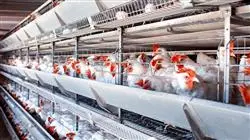University certificate
The world's largest faculty of veterinary medicine”
Introduction to the Program
A complete and total update in Animal Welfare with the most complete and rigorous online program on the market”

The Professional master’s degree in Animal Welfare is a new and updated program that arises from growing demand among veterinary professionals for specialized training in Animal Welfare to minimize animal suffering, since, nowadays, the consumer demands not only healthier and safer food, but also food obtained through practices that ensure the protection and welfare of animals.
The Professional master’s degree in Animal Welfare includes a comprehensive syllabus covering the most important areas in the field, production animals, swine, cattle, poultry, including fish farming, pets and zoo animals.
It addresses the concept of Animal Welfare and its evolution and applied ethology, one of the main welfare problems in all animal facilities.
It covers animal ethics or bioethics as a differentiating element with respect to other similar training courses. Since this topic is usually included in philosophy programs, in health sciences it is usually addressed very superficially. The Professional master’s degree in Animal Welfare, however, will thoroughly delve into it in depth given its relevance today.
The program will analyze current legislation and Animal Welfare in livestock farms, zoos, shelters and commercial animal establishments.
It devotes a complete module to Animal Welfare in fish farming, the ethics of which barely make an appearance in other training programs on account of its relatively new status.
Lastly, it includes two greatly important, complete modules devoted to Animal Welfare in transport and in slaughterhouses. These two moments in the life of these animals are extremely brief albeit crucial, since any incident, no matter how small, can upset the animal's welfare balance.
Join the elite with this highly effective training program and open new paths to aid in your professional progress"
This Professional master’s degree in Animal Welfare contains the most complete and up-to-date scientific program on the market. The most important features include:
- The latest technology in online teaching software
- A highly visual teaching system, supported by graphic and schematic contents that are easy to assimilate and understand
- Practical cases presented by practising experts
- State-of-the-art interactive video systems
- Teaching supported by telepractice
- Continuous updating and recycling systems
- Autonomous learning: full compatibility with other occupations
- Practical exercises for self-evaluation and learning verification
- Support groups and educational synergies: questions to the expert, debate and knowledge forums
- Communication with the teacher and individual reflection work
- Content that is accessible from any fixed or portable device with an Internet connection
- Supplementary documentation databases are permanently available, even after finishing the course
Our innovative telepractice concept will give you the opportunity to learn through an immersive experience, which will provide you with a faster integration and a much more realistic view of the contents: “learning from an expert”
Our teaching staff is made up of professionals from different fields related to this specialty. In this way we ensure that we deliver the educational update we are aiming for. A multidisciplinary team of professionals trained and experienced in different environments, who will develop the theoretical knowledge in an efficient way, but above all, they will bring their practical knowledge from their own experience to the course: one of the differential qualities of this program.
The efficiency of the methodological design of this Professional master’s degree, enhances the student's understanding of the subject. Developed by a multidisciplinary team of e-learning experts, it integrates the latest advances in educational technology. This way, you will be able to study with a range of comfortable and versatile multimedia tools that will give you the operability you need in your training.
The design of this program is based on Problem-Based Learning: an approach that views learning as a highly practical process. To achieve this remotely, we will use telepractice learning: with the help of an innovative interactive video system, and learning from an expert, you will be able to acquire the knowledge as if you were actually dealing with the scenario you are learning about. A concept that will allow you to integrate and fix learning in a more realistic and permanent way.
With a methodological design based on proven teaching techniques, this innovative program will take you through different teaching approaches to allow you to learn
in a dynamic and effective way"

A complete training program that will allow you to acquire the most advanced knowledge in all the areas of intervention of a specialized veterinarian"
Why study at TECH?
TECH is the world’s largest online university. With an impressive catalog of more than 14,000 university programs available in 11 languages, it is positioned as a leader in employability, with a 99% job placement rate. In addition, it relies on an enormous faculty of more than 6,000 professors of the highest international renown.

Study at the world's largest online university and guarantee your professional success. The future starts at TECH”
The world’s best online university according to FORBES
The prestigious Forbes magazine, specialized in business and finance, has highlighted TECH as “the world's best online university” This is what they have recently stated in an article in their digital edition in which they echo the success story of this institution, “thanks to the academic offer it provides, the selection of its teaching staff, and an innovative learning method aimed at educating the professionals of the future”
A revolutionary study method, a cutting-edge faculty and a practical focus: the key to TECH's success.
The most complete study plans on the university scene
TECH offers the most complete study plans on the university scene, with syllabuses that cover fundamental concepts and, at the same time, the main scientific advances in their specific scientific areas. In addition, these programs are continuously being updated to guarantee students the academic vanguard and the most in-demand professional skills. In this way, the university's qualifications provide its graduates with a significant advantage to propel their careers to success.
TECH offers the most comprehensive and intensive study plans on the current university scene.
A world-class teaching staff
TECH's teaching staff is made up of more than 6,000 professors with the highest international recognition. Professors, researchers and top executives of multinational companies, including Isaiah Covington, performance coach of the Boston Celtics; Magda Romanska, principal investigator at Harvard MetaLAB; Ignacio Wistumba, chairman of the department of translational molecular pathology at MD Anderson Cancer Center; and D.W. Pine, creative director of TIME magazine, among others.
Internationally renowned experts, specialized in different branches of Health, Technology, Communication and Business, form part of the TECH faculty.
A unique learning method
TECH is the first university to use Relearning in all its programs. It is the best online learning methodology, accredited with international teaching quality certifications, provided by prestigious educational agencies. In addition, this disruptive educational model is complemented with the “Case Method”, thereby setting up a unique online teaching strategy. Innovative teaching resources are also implemented, including detailed videos, infographics and interactive summaries.
TECH combines Relearning and the Case Method in all its university programs to guarantee excellent theoretical and practical learning, studying whenever and wherever you want.
The world's largest online university
TECH is the world’s largest online university. We are the largest educational institution, with the best and widest online educational catalog, one hundred percent online and covering the vast majority of areas of knowledge. We offer a large selection of our own degrees and accredited online undergraduate and postgraduate degrees. In total, more than 14,000 university degrees, in eleven different languages, make us the largest educational largest in the world.
TECH has the world's most extensive catalog of academic and official programs, available in more than 11 languages.
Google Premier Partner
The American technology giant has awarded TECH the Google Google Premier Partner badge. This award, which is only available to 3% of the world's companies, highlights the efficient, flexible and tailored experience that this university provides to students. The recognition as a Google Premier Partner not only accredits the maximum rigor, performance and investment in TECH's digital infrastructures, but also places this university as one of the world's leading technology companies.
Google has positioned TECH in the top 3% of the world's most important technology companies by awarding it its Google Premier Partner badge.
The official online university of the NBA
TECH is the official online university of the NBA. Thanks to our agreement with the biggest league in basketball, we offer our students exclusive university programs, as well as a wide variety of educational resources focused on the business of the league and other areas of the sports industry. Each program is made up of a uniquely designed syllabus and features exceptional guest hosts: professionals with a distinguished sports background who will offer their expertise on the most relevant topics.
TECH has been selected by the NBA, the world's top basketball league, as its official online university.
The top-rated university by its students
Students have positioned TECH as the world's top-rated university on the main review websites, with a highest rating of 4.9 out of 5, obtained from more than 1,000 reviews. These results consolidate TECH as the benchmark university institution at an international level, reflecting the excellence and positive impact of its educational model.” reflecting the excellence and positive impact of its educational model.”
TECH is the world’s top-rated university by its students.
Leaders in employability
TECH has managed to become the leading university in employability. 99% of its students obtain jobs in the academic field they have studied, within one year of completing any of the university's programs. A similar number achieve immediate career enhancement. All this thanks to a study methodology that bases its effectiveness on the acquisition of practical skills, which are absolutely necessary for professional development.
99% of TECH graduates find a job within a year of completing their studies.
Professional Master's Degree in Animal Welfare
The emergence of new and strict regulations or standards around animal welfare in its various contexts of application have allowed an exponential increase in labor demand for professionals specialized in this area of veterinary medicine. Understanding the growing need for academic updating as a situation directly related to the extensive occupational niche of the sector, at TECH Global University we have designed our Professional Master's Degree in Animal Welfare focused on the training of the professional. This postgraduate program will pay special attention to the new international legislation regarding the protection of animals on livestock farms, in experimental contexts, during transport and at the time of slaughter. Likewise, the following aspects will be updated: the particularities to be taken into account at the level of facilities and equipment to ensure the welfare of swine and the proper management of the environmental needs of sheep and goats focused on milk production.
Study an online Professional Master's Degree in Animal Welfare
The protection and proper care of animals dedicated to protein production requires the presence of specialized professionals with a broad knowledge of the responsibilities and constraints of the sector. In our Professional Master's Degree, animal welfare will be approached from the integral view of its multiple fields of implementation, contemplating the correct practices and processes that are part of its current and future panorama. In this way, we will focus on the modernization of the following concepts: the elements to be considered for the adequate physical and emotional health of zoo animals and the identification of the main particularities or aspects that are part of the adequate welfare of animals used in shows.







